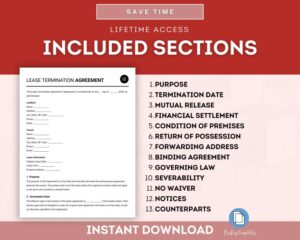
Welcome to the whimsical world of estate planning, where thinking about your future doesn’t have to feel like planning your own burial! Picture it as a treasure map, guiding your loved ones to your hidden riches and ensuring your assets don’t end up in a game of tug-of-war. Whether you’re a legal wizard or a layman, understanding the essentials of estate planning is crucial to protect what you hold dear.
Let’s dive into the fascinating components of estate planning, from documents to trusts, and more, all while keeping the mood light and the knowledge heavy!
Estate planning involves more than just scribbling down who gets Aunt Edna’s porcelain cat collection. It’s a detailed blueprint that includes various documents like wills, trusts, and powers of attorney, all working together to ensure your wishes are honored even when you’re off making otherworldly adventures. So grab your quill (or keyboard), and let’s embark on this enlightening journey to secure your legacy!
Estate Planning Essentials

Estate planning is not just a fancy term that sounds good at cocktail parties; it’s a vital step to ensure your hard-earned assets don’t end up in a game of “who gets what” after you’re gone. Think of it as your last will and testament, but with better planning and fewer family feuds. A well-crafted estate plan protects your financial legacy, ensuring your wishes are honored while sparing your loved ones from chaos.An estate plan encompasses a variety of components, each playing a unique role in detailing how your assets should be handled after your departure.
It’s not just about who gets the cozy beach house or the vintage comic book collection; it’s about making sure that your loved ones aren’t left staring at a mountain of paperwork or wrestling over your prized possessions. The essential ingredients of a thorough estate plan include wills, trusts, powers of attorney, and healthcare directives, each serving a specific purpose in safeguarding your wishes.
Core Components of an Estate Plan
Understanding the various components of an estate plan is crucial for effective asset protection. Here’s a breakdown of the essential documents and instruments that should be part of your plan:
- Will: This document Artikels how your assets will be distributed upon your death. It’s like the script for your final act, ensuring your wishes are clear and legally binding.
- Trust: A trust allows for the management of your assets during your lifetime and specifies how they will be distributed after your death. It’s a versatile tool that can help avoid probate and protect assets from creditors.
- Power of Attorney: This legal document grants someone the authority to make decisions on your behalf if you become incapacitated. Think of it as choosing your own adventure, but with your finances and healthcare instead of dragons and treasure maps.
- Healthcare Directive (Living Will): This document provides guidance on your medical care preferences should you be unable to communicate. It’s your chance to be the director of your own healthcare drama.
- Beneficiary Designations: These are the specifics on who receives your assets, such as life insurance policies and retirement accounts. It’s essential to keep these updated to reflect your current wishes.
Each of these components plays a critical role in building a fortress around your assets. Failing to establish a comprehensive estate plan can lead to unnecessary taxes, probate, and disputes among heirs, turning your legacy into a reality show no one wants to watch.
“Good estate planning ensures that your family members don’t end up in a tug-of-war over your stuff.”
Trusts in Estate Planning
When it comes to estate planning, trusts are like the Swiss Army knives of the financial world—versatile, handy, and sometimes a little confusing. They can help you manage your assets, protect your loved ones, and even dodge a tax bullet or two. Let’s dive into the different types of trusts and how they can be your best friends in planning for the future.
Types of Trusts and Their Benefits
Trusts come in various shapes and sizes, each with its own unique benefits. Understanding these types can help you determine which one might suit your needs best. Here’s a quick look at some of the most popular trusts:
- Revocable Trusts: These trusts can be altered or dissolved by the grantor during their lifetime, allowing flexibility. They’re like that pair of stretchy pants you can wear for Thanksgiving dinner—adaptable and comfortable.
- Irrevocable Trusts: Once established, these trusts can’t be changed without the beneficiary’s consent, providing a solid wall against creditors and minimizing estate taxes. Think of them as the fortress of solitude for your assets.
- Testamentary Trusts: Created within a will, these trusts come into effect upon the grantor’s death, helping to manage assets for beneficiaries who may be too young or inexperienced to handle their inheritance. They’re the responsible babysitter of your estate.
- Living Trusts: These are set up during the grantor’s lifetime and can help avoid probate. They act like a VIP pass that skips the long lines. Who wouldn’t want that?
Minimizing Taxes with Estate Plan Trusts
One of the key advantages of using trusts in your estate plan is their ability to minimize taxes. Trusts can reduce the amount of taxable income and help your heirs keep more of what you’ve worked hard to build. Here are some ways trusts can be a tax-saving superhero:
- Income Splitting: Trusts can allow income to be distributed among beneficiaries, potentially lowering the overall tax burden. By playing the field, you might get out of paying more than your fair share.
- Charitable Remainder Trusts: These allow you to donate assets to a charity while still receiving income from those assets during your lifetime. It’s the win-win of charitable giving: you help others while keeping your pockets lined.
- Generation-Skipping Trusts: By skipping generations for tax purposes, these trusts can shield a significant amount of wealth from estate taxes, allowing you to pass the baton (and the bucks) to your grandkids without the taxman taking a hefty slice.
Key Factors to Consider When Creating a Trust
Creating a trust is not a “one size fits all” deal; several key factors need consideration to avoid turning your estate plan into a complicated mess. Think of these factors as the ingredients for a successful recipe:
- Purpose of the Trust: Clearly define what you want to achieve with the trust—protection of assets, tax savings, or control over distribution. This will guide the entire process.
- Trustee Selection: Choose a trustee you trust (pun intended) who will manage the trust according to your wishes, because the wrong choice can lead to a sitcom-worthy disaster.
- Beneficiaries: Decide who will benefit from the trust and in what manner. Be sure to communicate your wishes, because family feuds over an inheritance are never pretty.
- Tax Implications: Consult a tax professional to understand how the trust will affect your taxes, ensuring you don’t end up with a surprise tax bill that’ll make you feel like you’ve just stepped on a LEGO.
“Trusts may be the secret sauce to a successful estate plan, bringing flavor and stability to your legacy.”
Financial Aspects of Estate Planning
When it comes to estate planning, balancing your financial strategy is like a game of chess—each piece must move harmoniously to capture the ultimate prize: peace of mind. Integrating financial aspects into your estate planning doesn’t just ensure your wealth is distributed according to your wishes; it’s also about optimizing how you manage debt, assets, and future financial obligations for your heirs.
So grab your calculator and your favorite beverage, because we’re diving into the finances of forever!
Strategies for Integrating Finance with Estate Planning
Integrating your financial strategy with estate planning is crucial for creating a seamless transition of your wealth. Here are some strategies to consider:
- Utilize Trusts: Establishing a trust can help protect your assets while potentially reducing estate taxes. It’s like a financial fortress for your riches.
- Maximize Tax Benefits: Take advantage of tax-deferred accounts and exemptions. Investing in tax-efficient vehicles can minimize the tax burden on your heirs.
- Budget for Funeral Expenses: Consider pre-paying funeral expenses or setting aside funds specifically for this purpose to avoid financial strain on your loved ones.
- Plan for Long-Term Care: Factor in the costs of long-term care into your estate plan, possibly by purchasing insurance to ensure your assets are preserved.
Debt Management Options Relevant to Estate Planning
Managing debt is a critical component of estate planning, ensuring that your liabilities don’t overshadow your assets. Here are key options for debt management that can keep your financial ship afloat:
- Debt Repayment before Passing: Aim to pay off high-interest debts, like credit cards, as part of your planning process to alleviate burdens on your beneficiaries.
- Debt Forgiveness Strategies: Certain debts can be forgiven upon death, such as federal student loans. Understanding which debts can die with you can ease the financial transition for your heirs.
- Joint Accounts Consideration: If you have joint accounts, both parties are responsible for the debt. Ensure your partner is aware of the potential implications.
Leveraging Home Equity Loans in Estate Planning
Home equity loans can play a significant role in estate planning, especially if managed wisely. It allows homeowners to tap into their property’s value while they’re still alive. Here’s how to effectively leverage this financial tool:
- Fund Estate Planning Costs: Use a home equity loan to cover the costs associated with creating and maintaining your estate plan, such as legal fees and trust funding.
- Support Your Heirs: Consider using a home equity loan to provide financial assistance to your beneficiaries while you’re still around, helping them avoid future debt.
- Maintain Financial Flexibility: Keeping a home equity line of credit can give you a financial safety net for unexpected expenses, ensuring that your estate remains intact for your heirs.
“Planning is bringing the future into the present so that you can do something about it now.” – Alan Lakein
Last Recap

And there you have it, folks! A comprehensive yet entertaining jaunt through the land of estate planning. Remember, it’s not just about what you leave behind; it’s about how you ensure your loved ones navigate the waters of your legacy without getting lost at sea! With the right estate plan, you can rest easy knowing that your treasures—be they financial or sentimental—will be handled just as you envisioned.
So, get to planning, and let your legacy shine brighter than a diamond in a treasure chest!
Helpful Answers
What is the primary purpose of estate planning?
The primary purpose of estate planning is to ensure that your assets are distributed according to your wishes after you pass away, while also minimizing taxes and protecting your loved ones.
Who should create an estate plan?
Anyone with assets or dependents should consider creating an estate plan, regardless of age. It’s never too early to plan for the future!
What happens if I die without an estate plan?
If you die without an estate plan, your assets will be distributed according to state laws, which might not align with your wishes, potentially leading to family disputes.
Can I change my estate plan after it’s created?
Absolutely! You can revise your estate plan as your circumstances change, such as marriage, divorce, or the birth of a child.
Are trusts only for the wealthy?
Nope! Trusts can be beneficial for anyone who wants to manage their assets and provide for their loved ones, not just the rich and famous!





